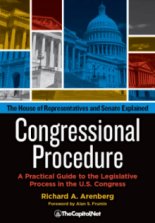Congress: Informal Groups, Caucuses, and Congressional Member Organizations (CMO)
Most people are quite familiar with the idea of committees and subcommittees within Congress, but there are also many informal congressional groups. These groups can include informal groups, caucuses and Congressional Member Organizations (CMOs). While they may be called by different names, all of these groups refer to ad hoc social or policy groups that … Read more



